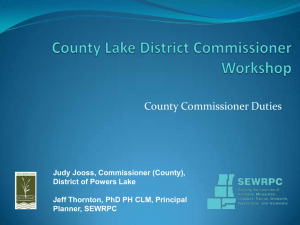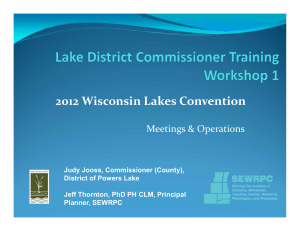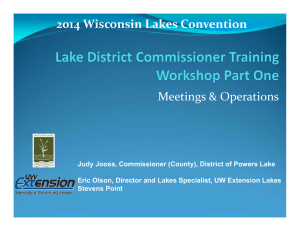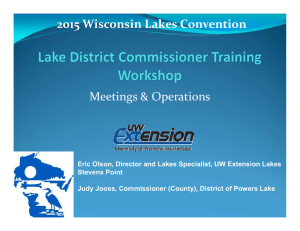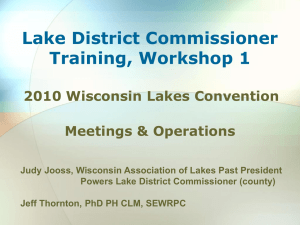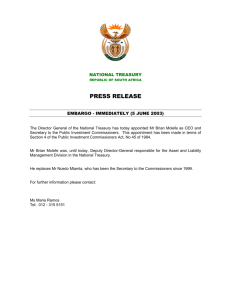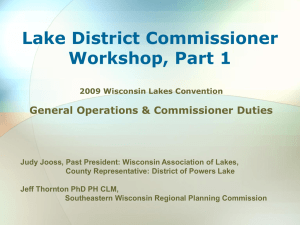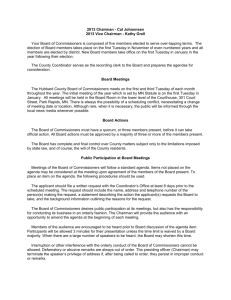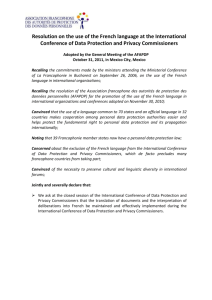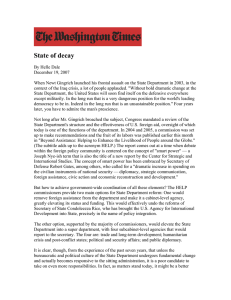2013 Wisconsin Lakes Convention Meetings & Operations
advertisement
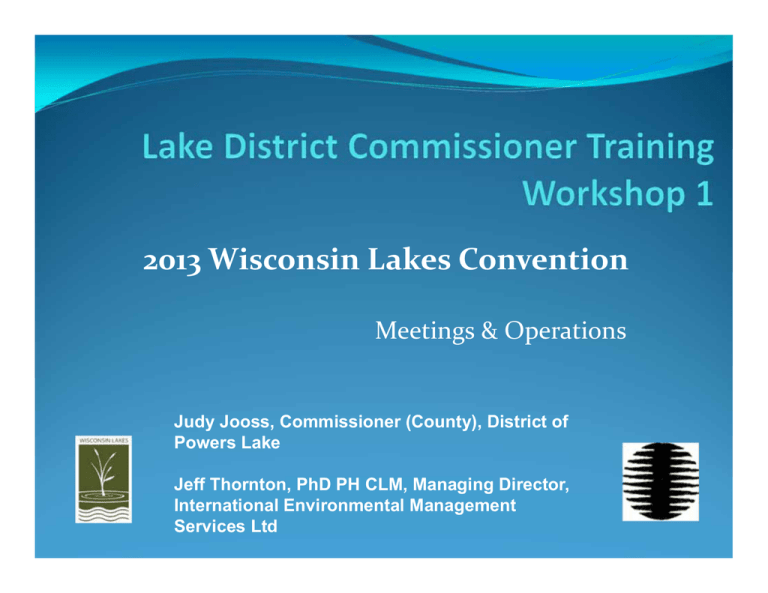
2013 Wisconsin Lakes Convention Meetings & Operations Judy Jooss, Commissioner (County), District of Powers Lake Jeff Thornton, PhD PH CLM, Managing Director, International Environmental Management Services Ltd We’d like to meet you… Every lake district is unique and will have its own unique situations — nothing is too trivial we are always learning from each other — “networking” Lake Districts are: Specialized Units of Government Powers and Operations are set by law Governed under Chapter 33 of Wis. Stats. Governed under Municipal Law (Chapter 66, Wis. Stats.) Lake Districts are not: Voluntary associations A lake district is governed by: The Board of Commissioners The Annual Meeting Board of Commissioners ‐ 1 Standard board: 3 elected commissioners One must be a district resident 2 appointed commissioners Enlarged board: 5 elected commissioners Can not be reversed 2 appointed commissioners p. 63-66 Board of Commissioners ‐ 2 Elected commissioners: 3 year staggered terms secret ballot is required even if there is no contest Vacancies filled by appointment Are considered local government officials May take oath of office Board of Commissioners ‐ 3 2 appointed commissioners: Appointee of the city, village or town with the largest equalized valuation Appointee nominated by county Land and Water Conservation Committee & appointed by county board Board of Commissioners ‐ 4 Officers of the District: Chairperson, secretary, & treasurer One year term Elected by the board of commissioners p. 66 Duties of Commissioners Chairperson presides at all meetings of district Treasurer receives & takes charge of all monies Secretary keeps minutes & other district records, prepares & sends notices of meetings The board shall Meet quarterly, not including the annual meeting Manage the day‐to‐day activities of the district Schedule the annual meeting Propose an annual budget p. 68 Ethical Standards for Commissioners As local government officials… you are prohibited from: Taking action on something in which you have a financial interest Accepting a gift that could influence vote/action Using position to obtain financial gain Using position to benefit yourself p. 68 Legal Responsibilities of Commissioners As local government officials… you are required to follow: Open Meetings Law Public Records Law Grievance procedure in Ch 66, Wis. Stats. Budget & accounting laws in Ch 33, Wis. Stats. Different from lake associations, clubs, and other civil organizations p. 36, 68-69 Is this a walking quorum? p. 68 What is required by the Open Meetings Law? Advance public notice of a meeting — at least 24 hours Sub‐groups of the board must also post meetings All business must be conducted in open session unless otherwise noticed Special requirements for closed sessions [Ch 19.85(1), Wis. Stats. ] http://www.doj.state.wi.us/dls/OMPR/2010OMCG‐ PRO/2010_OML_Compliance_Guide.pdf. Requirements for “open session” The meeting must be held in an area that is large enough and reasonably accessible to members of the public Meetings should not be held in private homes, private rooms in restaurants Meetings should be held in locations near the public that is being served The Public Must Be Notified Notice may be posted at three different locations in the area frequented by members of the district, or Notice may be given in a newspaper Email & internet notices may not be used in place of postings or publication A Public Notice Includes: Time Date Place Subject matter The agenda needs to contain enough detail for someone to understand the issue and decide whether or not they need to attend the meeting. It’s not enough to say “boating.” Specific nature of agenda item should be spelled out: “discussion and possible action on the hiring of water safety patrols”. Good idea to include time for public comment. Record Keeping Open Records Requirements Keep minutes – at least of motions and votes Requests for records Must provide May charge for this service Options for making records easily available Website Post at library, public launch, town hall, post office… http://www.doj.state.wi.us/dls/OMPR/2010OMCG‐ PRO/2010_Pub_Rec_Outline.pdf Insurance and Grievances Employee Compensation Fund Commissioners as Employees In the case of elected or appointed officials in the service of the State of any Municipality, a minimum individual payroll of $1,560 per year will apply. Section 102.01(2)(d), Wis. Stats. Section 102.07(1)(b), Wis. Stats. Districts can “self‐insure” [NOT RECOMMENDED] or purchase a policy from a licensed insurance carrier in the State of Wisconsin. Employee Grievance Policy As of October 2011, a local governmental unit, not having a civil service system, must have: A grievance policy A disciplinary policy A workplace safety policy Section 66.0509(1m)(c), Wis. Stats. Employee Grievance Policy The grievance policy must include: A written document specifying the process that a grievant and an employer must follow. A hearing process before an impartial hearing officer. An appeal process in which the highest level of appeal is the governing body of the local governmental unit. Section 66.0509(1m)(d), Wis. Stats. Annual & Special Meetings Annual & Special Meetings Property owners & electors have voice Notices – Open Meetings Law Extra requirements Records – Public Records Law Same as for commissioner meetings Time – annual meeting must occur between May 22 & September 10, unless another date is selected at the previous annual meeting p. 70-74 Notice of Annual Meeting 14 days before meeting: Mail to property owners (required) Mail to electors (option: may vote to use legal ad) Publish paid legal notice in two successive issues of official paper (resolution needed to substitute) Mail notice to WDNR Provide notice to any media that requests it p. 70 Annual Meeting Example Timeline Prepare agenda June 26 Print copies Send to Get mailing list ready paper Assemble mailing June 30 Mail date July 3 July 10 publish publish July 14 Annual Meeting p. 70 Notice of Annual Meeting Time, date, place Agenda List of items to be considered, be specific Public comment period Proposed budget Detail Proposed levy Candidates – not required p. 70-72 Who can vote? A person whose name appears on the tax roll. A person who owns title to real property – a “spouse” may vote. One official representative of a trust or corporation in the district. A registered voter resident in the district. Owners of multiple properties can only vote once. p. 73 The Voting Process Be prepared Have a copy of the tax roll Voters self‐certification example Color coded ballots or voter ID cards Organize the process Have a formal check‐in process Get enough help Serve refreshments, have exhibits “Complaint department” No absentee ballots or proxies Funding Lake Districts Workshop 2 will cover Budgeting, Bookkeeping, & Financing The Government 4‐Step appropriation – asking for the money allocation – assigning the money for a specific purpose authorization – allowing the money to be spent accounting – reporting that the money has been spent for the designated purpose p. 76-79 Special Meetings ‐ 1 May be held at any time of the year May be scheduled by the board May be scheduled upon petition of 10% of the property owners & electors Subject to same notice requirements as annual meeting p. 74 Special Meetings ‐ 2 Can NOT approve an annual budget May amend the budget Can NOT dissolve the district Can NOT reconsider a matter resolved during another special meeting. p. 74 Bylaws – yes / no / maybe… Drawbacks The simpler, the better Need to comply with Chapter 33 & other laws Cannot conflict / Ch 33 supersedes Provide for making changes Alternatives Operating policies p. 82 Robert’s Rules Purpose is to help conduct an orderly meeting Become familiar with basics But don’t become bogged down in procedure Order of motions ‐ on CD www.robertsrules.com Communications How do you communicate with your electors and property owners? Newsletter Website Other… grapevine, blog? Districts should be clear & consistent with their identity What’s your name and where do you live? Be consistent with what you call your lake district Are you Bass Lake District, Bass Lake PRD, District of Bass Lake, Bass Lake District of Polk County, or … Establish a P.O. Box for district mail Networking Wisconsin Lakes WDNR UW‐Extension ‐‐ Lakes Partnership Each other Lake Leaders Lakes Convention Lake List www.uwsp.edu/cnr/uwexlakes North American Lake Management Society Contact us… Send questions or suggestions Jeff Thornton iems@aol.com Judy Jooss jjooss@charter.net
